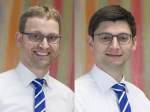
You will be presenting at Innoform’s 6th Stand-up Pouch Conference. What is the core message of your contribution?
Benjamin Kampmann (BK): We want to present how we are already closing cycles for other products and how we are applying these approaches to the spouts.
Mike Landwehr (ML): “This will show that the spout is only part of the path to a fully recyclable bag made from post-cosumer recycled (PCR) material.
Which audience do you wish for and why?
BK: Actors in the entire value-added chain, film and bag manufacturers, partners from the mechanical engineering sector and, in particular, bottlers and marketers who want to participate. Only if everyone pulls together cycles can be really closed.
ML: We would be pleased if both decision-makers and employees from the field were able to develop and implement innovative solutions.
How do you assess the overall development of the stand-up pouch (SUP) in relation to your field of activity?
ML: We are developing the weld-in spouts for stand-up pouches into an independent, innovative business field in the packaging sector.
BK: For us in the innovation management, the demands of the market mean that we are constantly finding new and exciting fields of activity.
You stand up for a circular economy in case of welded parts. What is the main advantage of your system and approach?
BK: Closing material cycles helps to conserve resources, as no new raw materials have to be used. If we produce the spout from PCR material, we save these raw materials. If the weld-in spouts and stand-up pouches also become fully recyclable as a system and the material cycle is closed, this savings potential multiplies.
ML: There will only be innovative solutions if we look at the complete value-added chain of the bag. We do this with our approach of the FAMAC PouchBooster.
What are the reasons for the continuous growth of the stand-up pouch market in your opinion?
BK: The pouch is a packaging which make innovative packaging solutions with extraorinary properties, such as an oxgen barrier, possible – where only a small quantity of material is required.
ML: If you compare the SUP with alternative packaging such as cans, bottles, glass or cardboard packaging, the advantage also becomes clear economically.
How do you classify the stand-up pouch in relation to the demand of circular economy?
BK: The stand-up pouch is already today a material-efficient packaging. This material efficiency can be further increased if the entire system of bag and spout becomes recyclable.
ML: Then the bag used can become a new PCR raw material again in the future. This is the vision!
Which stand-up pouch concept did impress you most?
ML: It is amazing how quickly the market for packagings for small children is changing to pouches.
BK: It is also exciting to see how existing products provide new advantages for consumers by being packed in stand-up pouches. There are many examples of this…
What do you recommend to a brand owner who wants to start with pouches?
ML: They should consider the entire value chain. Only those who can assess the entire production process will find the most economical solution.
BK: There will be different results for different products.
And then another private question: What inspires you outside your professional activity?
ML: My family and my friends.
BK: Walking through woods and fields.
Mike Landwehr (Dipl.-Wirt.-Ing) studied at the private University of Applied Sciences for Economics and Technology (FHWT) in Vechta and completed his studies as an industrial engineer together with an apprenticeship with Pöppelmann. After a subsequent trainee program, he started project planning for the FAMAC division in 2002.
Currently, he is project manager for various development and series projects in the food, cosmetics and pharmaceutical industries. This also includes the development and distribution of the FAMAC standard range of “Sealing pourers and caps for film bags”. His favorite topic is also the development and realization of innovative pouring and packaging systems for film bags with pourers.
Benjamin Kampmann graduated from the University of Applied Sciences Osnabrück with a degree in plastics technology in combination with a parallel education in the field of extrusion coating. Since 2010 he has been working at Pöppelmann, first in the area of “New Technologies” and now in “Innovation Management”.
In this field of work he supports the company-wide initiative “PÖPPELMANN blue®”, whose aim is to strengthen the recycling concept at Pöppelmann and in the plastics industry as a whole.
Geschrieben am 27. Juni, 2018
Kategorie: Abfülltechnik, Allgemein, Barrierefolien, Biofolien, Entsorgung / Recycling, Folienherstellung/Veredelung, Lebensmittelverpackung, Neuigkeiten, Standbeutel, Verpackungsdesign
Tags: Abfüller, Ausgießer, Benjamin_Kampmann, Beutelhersteller, Dosen, Einschweiß-Ausgießer, Einsparpotentia, FAMAC PouchBoosters, Flaschen, Folienhersteller, Glas, Innovationsmanagement, Interview, Kartonverpackung, Kreisläufe, Kreislaufwirtschaft, Maschinenbau, materialeffizient, materialeffizienz, Materialeinsatz, Materialkreisläufe, Mike_Landwehr, PC-09-18, Post Consumer Recyclat (PCR), Produktionsprozess, recyclingfähig, Ressourcenschonung, Rohstoffe, Sauerstoffbarriere, Spouts, Standbodenbeutel, Verbraucher, Vermarkter, Verpackung, Verpackungslösungen, Wertschöpfungskette, wirtschaftlichste Lösung.